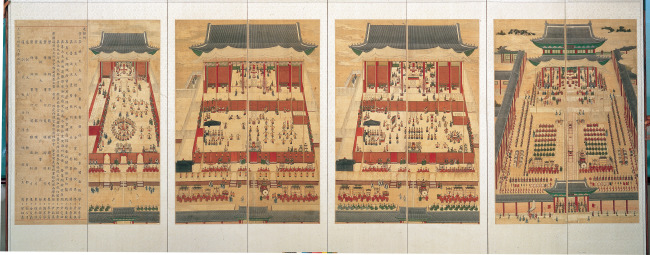 |
“Musinnyeonjinchando” (National Museum of Korea) |
A total of 71 artifacts reflecting the prosperity and cultural diversity of the Joseon period (1392-1910) will be displayed at the San Francisco Asian Art Museum from Friday.
“In Grand Style ― Celebrations in Korean Art During The Joseon Dynasty” will be the first major U.S. exhibition to examine the legacy of the Yi dynasty ― among the world’s longest running ― that continues to resonate in Korean culture today, the organizers said.
The exhibition is to feature four themes: what it meant to be a king during the Joseon period, royal processions and banquets, the power of women at the royal court, and the lives and celebrations of the people of Joseon.
Among the exhibited items are “Hwaseongneunghaengdo,” a 64-foot handscroll depicting King Jeongjo’s (r. 1776-1880) procession to his father’s tomb. In 1795, King Jeongjo held a grand parade to visit the tomb of his father, Crown Prince Sado (1735-1762), located in Hwaseong, Gyeonggi Province. Crown Prince Sado suffocated to death after being ordered by his father King Yeongjo (r. 1694-1776) to climb into a large wooden rice storage chest which was then sealed. King Jeongjo’s visit was a declaration of the reinstatement of his father and the parade was recorded in the painting.
“Musinnyeonjinchando” depicts royal banquets hosted by King Heonjong (r. 1834-1849), including the 59th birthday of Queen Sunwon. The painting on silk depicts the power of women in the palace, though they never became official rulers.
Other notable items include an ornate palanquin used to carry the king, a book of praise for King Taejo, the founder of Joseon, a book made entirely of jade and other precious stones.
“To enhance the visitor experience there will be an interactive digital display provided by Leeum, Samsung Museum of Art. Visitors can enjoy art brought to life in a new digital fashion,” the organizers said. The exhibition will run through Jan. 12, 2014.
By Bae Ji-sook (
baejisook@heraldcorp.com)




![[Herald Interview] 'Trump will use tariffs as first line of defense for American manufacturing'](http://res.heraldm.com/phpwas/restmb_idxmake.php?idx=644&simg=/content/image/2024/11/26/20241126050017_0.jpg)


![[Health and care] Getting cancer young: Why cancer isn’t just an older person’s battle](http://res.heraldm.com/phpwas/restmb_idxmake.php?idx=644&simg=/content/image/2024/11/26/20241126050043_0.jpg)
